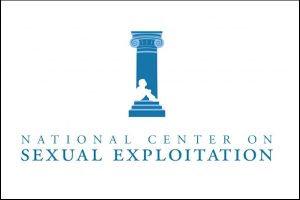No Surprise: Anti-Porn Group Supports EARN IT Act
 WASHINGTON — A prominent player in the anti-porn lobby has announced its support for the controversial EARN IT Act.
WASHINGTON — A prominent player in the anti-porn lobby has announced its support for the controversial EARN IT Act.
As previously reported by YNOT, Sens. Richard Blumenthal, D-Conn., and Lindsey Graham, R-S.C., reintroduced the “Eliminating Abusive and Rampant Neglect of Interactive Technologies” Act as a means to counter the spread of child sexual abuse material (“CSAM”) on the web.
The National Center on Sexual Exploitation (NCOSE) announced its support for the EARN IT Act in January. A statement from the group’s head, chief executive Dawn Hawkins, indicates that her organization believes that “the EARN IT Act is the best piece of tech accountability legislation to ensure tech companies do the right thing.”
“We are pleased that this updated EARN IT Act addresses others’ concerns about encryption. But most importantly, this bill will ensure that tech companies finally address, prevent, and end this horrific criminality. Tech has the capability of doing so but needs Congress to hold it accountable,” Hawkins added.
The original version of EARN IT was introduced in 2020, but the sponsors withdrew due to overwhelming opposition across party lines. Blumenthal and Graham faced strong opposition from civil liberties groups like the Americans for Prosperity and the American Civil Liberties Union due to concerns over warrantless surveillance promised by the design of the act.
The American Civil Liberties Union and Americans for Prosperity, including several human rights groups from all over the world (including human trafficking task forces), oppose the EARN IT Act. Currently, the EARN IT Act’s 2022 form wouldn’t make the internet safer and would gut the third liability shield found in Section 230 of the Communications Decency Act.
Section 230 is responsible for the flourishing of constitutionally-protected speech on the internet and the web’s development as the most vital business mechanism in the world today.
Hawkins and NCOSE are adamant anti-porn advocates, relying on cherry-picked data and sound bites to insinuate that the adult entertainment industry doesn’t recognize the issue of CSAM.
On the contrary, the adult entertainment industry leads the fight against CSAM. The Association of Sites Advocating for Child Protection (ASACP) is one of the most active NGOs operating today in the fight, working to hold criminal elements accountable and ensure that adult companies comply with all applicable federal and international laws. The association is sponsored by generous donations from across all segments of the adult entertainment space and is staffed and advised by some of the foremost legal professionals in the United States and Europe.
Much of the current moral panic about the spread of CSAM and the adult industry comes from former New York Times opinion contributor Nicholas Kristof. Kristof, a journalist with a long track record for reporting the facts, published several columns in late 2022 and early 2021 that were oddly misreported, one-sided, relied on the comments of so-called anti-porn “experts”, and completely neglected the input of the adult industry’s efforts to counter CSAM.
A report by YNOT featured comments from Tim Henning, the executive director of ASACP, revealing his concern that Kristof never reached out to his team or the foundation about their work to counter CSAM.
“Mr. Kristof did not reach out to ASACP for comment,” Henning said. “He also ignored requests by other industry journalists to reach out to ASACP. In fact, there have been attempts by other industry journalists to make this happen.”
“A great many of the individuals that work in this space are parents and grandparents themselves and have the same feelings and concerns that the rest of society has when any child is victimized in such an abhorrent way,” Henning added. “I am very proud of the accomplishments of ASACP over the past quarter-century especially considering the size, funding, and resources at our disposal.”
Anti-porn groups overlook the anti-CSAM work of the adult industry willfully. So, it’s no surprise NCOSE are endorsing the EARN IT Act as a means to hold ‘big tech’ and (in many ways) ‘big porn’ accountable. Unfortunately, these groups often disregard the fact that the vast majority of CSAM cases are originated on mainstream platforms like Snapchat, Meta’s Facebook or Instagram and Twitter.
Data from the National Center for Missing and Exploited Children (NCMEC) showed that Facebook was the source of 20,307,216 reports of CSAM in 2020. There were only about 13,000 cases reported by MindGeek, the parent of Pornhub.com, and other electronic service providers like it.
In that same data, Facebook accounted for 95 percent of all cases of CSAM reported to the NCMEC. The center has expressed its support for the current form of the EARN IT Act, but the data speaks for itself. Plus, the center is a nonprofit that was chartered by and is still subject to some degree of oversight by the United States Congress. NCMEC was established by an act of Congress and the endorsement of President Ronald Reagan in 1984. Groups like NCOSE lack this oversight.













